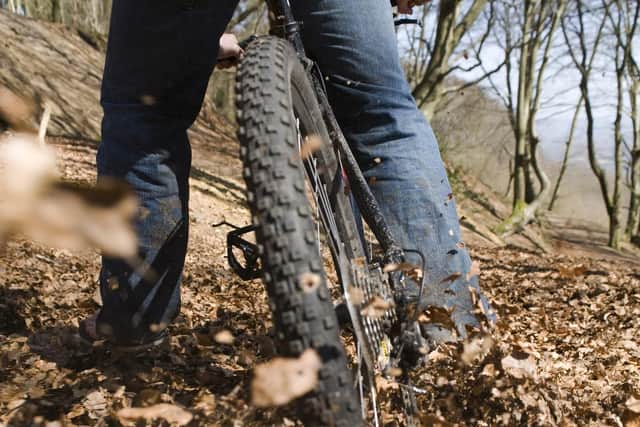National Trust urges West Sussex bikers to protect rare habitats by sticking to trails
and live on Freeview channel 276
The trust's beauty spots remain open to local visitors for exercise during the latest lockdown but visitors are urged to be mindful of the rare habitats they are in, 'to avoid long term
damage'.
"Landscapes are more susceptible to damage at this time of year due to the colder and wetter weather," a National Trust spokesperson said.


Advertisement
Hide AdAdvertisement
Hide Ad"Excessive erosion to routes doesn’t just leave a visual impact on the landscape it also affects wildlife.
"Once vegetation is lost through erosion, soil and stone can quickly wash off from fragile heathland habitats."
The National Trust said rangers and volunteers have seen a 'substantial increase' in unofficial mountain bike trails in nature reserves and woodlands, following government restrictions on travel during lockdown, including at; Hindhead Commons; Black Down; Woolbeding Common and Ludshott Common.
The spokesperson added: "This is causing the ground to be churned up and compacted, with damage to bluebell woods, heathland heathers and wildflowers, which are key food sources for butterflies.
Advertisement
Hide AdAdvertisement
Hide Ad"From spring, ground-nesting birds such as nightjar are affected."
David Elliott, lead ranger for the South Downs West, said the trust wants to do the 'right thing for everyone who uses and cares for these places' during lockdown 'and the wildlife that depends on them'.
He added: "We know how important it is for people to get out in nature for exercise and wellbeing at the moment.
"Equally we are hearing from neighbouring communities in the South Downs and Surrey Hills, who are desperately concerned that new ramps, berms and downhill trails are appearing on
heaths and in woodlands.
Advertisement
Hide AdAdvertisement
Hide Ad"In many cases these are SSSIs (Site of Specific Scientific Interest), designated as unique habitats for nature. New structures require licensed permission from Natural England so we
are obliged in many cases to remove them."
Mr Elliot said the trust is appealing to local cycling groups and shops for their help in advising people to stick to approved trails, and 'not to condone social media content' which has been filmed on unofficial downhill tracks or nature reserves.
"The best way to check where you can cycle is by looking at an ordnance survey map and finding the green dashed lines showing a bridleway," he said.
"In some SSSI nature reserves, such as Woolbeding Common, there are no listed bridleways or permissive paths for cyclists, so we are kindly asking people to walk for their local exercise here, rather than ride.
Advertisement
Hide AdAdvertisement
Hide Ad"We are cyclists ourselves and we sympathise; but we’ll be sticking to the tarmac or bridleways this winter and spring. Please think of others; think of the wildlife. The only way
that these precious wild places will survive is if we pull together to preserve them."